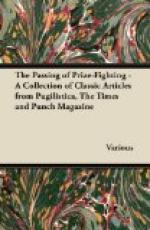It was lucky for John that A.C.A. had been blessed with pleasant dreams, or his attachment to Madeira might have occasioned his discharge from No. 24, Pleasant-terrace.
The note was an invitation to Mrs. Waddledot’s opera-box for that evening. The performance was to be Rossini’s “La Cenerentola,” and as Collumpsion recollected the subject of the opera, his heart fluttered in his bosom. A prince marrying a cinder-sifter for love! What must the happy state be—or rather what must it not be—to provoke such a condescension!
Collumpsion never appeared to such advantage as he did that evening; he was dressed to a miracle of perfection—his spirits were so elastic that they must have carried him out of the box into “Fop’s-alley,” had not Mrs. Waddledot cleverly surrounded him by the detachment from the corps of eighteen daughters, which had (on that night) been placed under her command.
Collumpsion’s state of mind did not escape the notice of the fair campaigners, and the most favourable deductions were drawn from it in relation to the charitable combination which they had formed for his ultimate good, and all seemed determined to afford him every encouragement in their power. Every witticism that he uttered elicited countless smiles—every criticism that he delivered was universally applauded—in short, Agamemnon Collumpsion Applebite was voted the most delightful beau in the universe, and Agamemnon Collumpsion Applebite gave himself a plumper to the same opinion.
On the 31st of the following month, a string of carriages surrounded St. George’s Church, Hanover-square, and precisely at a quarter to twelve, A.M., Agamemnon Collumpsion Applebite placed a plain gold ring on the finger of Miss Juliana Theresa Waddledot, being a necessary preliminary to the introduction of our hero, the “Heir of Applebite.”
* * * * *
EPIGRAM.
“I wonder if Brougham thinks as
much as he talks,”
Said a punster perusing a trial:
“I vow, since his lordship was made
Baron Vaux,
He’s been Vaux et praeterea nihil!”
* * * * *
THE TWO FATAL CHIROPEDISTS.
Our great ancestor, Joe Miller, has recorded, in his “Booke of Jestes,” an epitaph written upon an amateur corn-cutter, named Roger Horton, who,
“Trying one day his corn to mow
off,
The razor slipp’d, and cut his toe
off.”
The painful similarity of his fate with that of another corn experimentalist, has given rise to the following:—
EPITAPH ON LORD JOHN RUSSELL, WHO EXPIRED POLITICALLY, AFTER A LINGERING ILLNESS, ON MONDAY EVENING, AUGUST 30, 1841.
In Minto quies.
Beneath this stone lies Johnny Russell,
Who for his place had many a tussel.
Trying one day the corn to cut
down,
The motion fail’d, and he was put
down.
The benches which he nearly grew to,
The Opposition quickly flew to;
The fact it was so mortifying,
That little Johnny took to dying.




